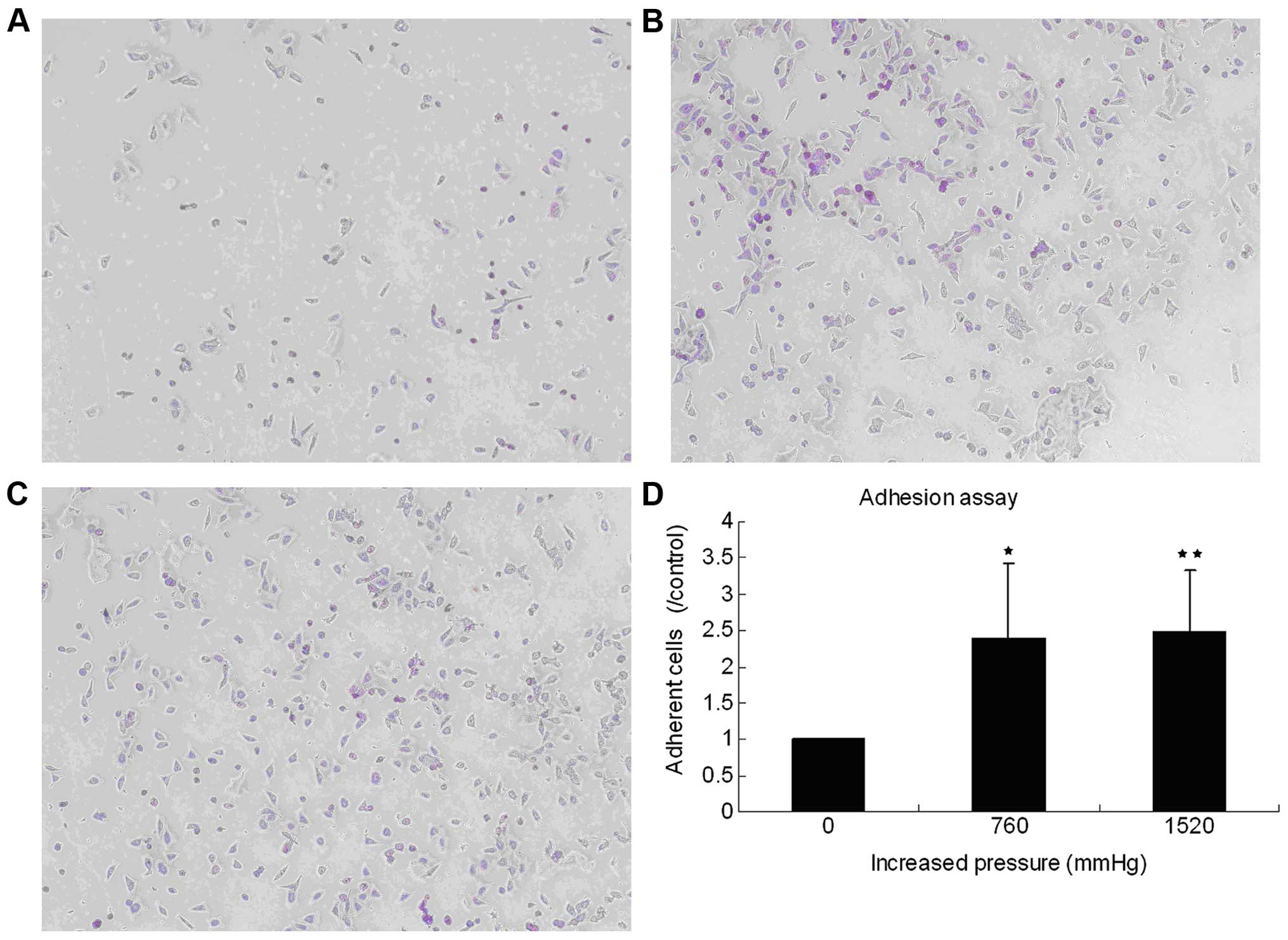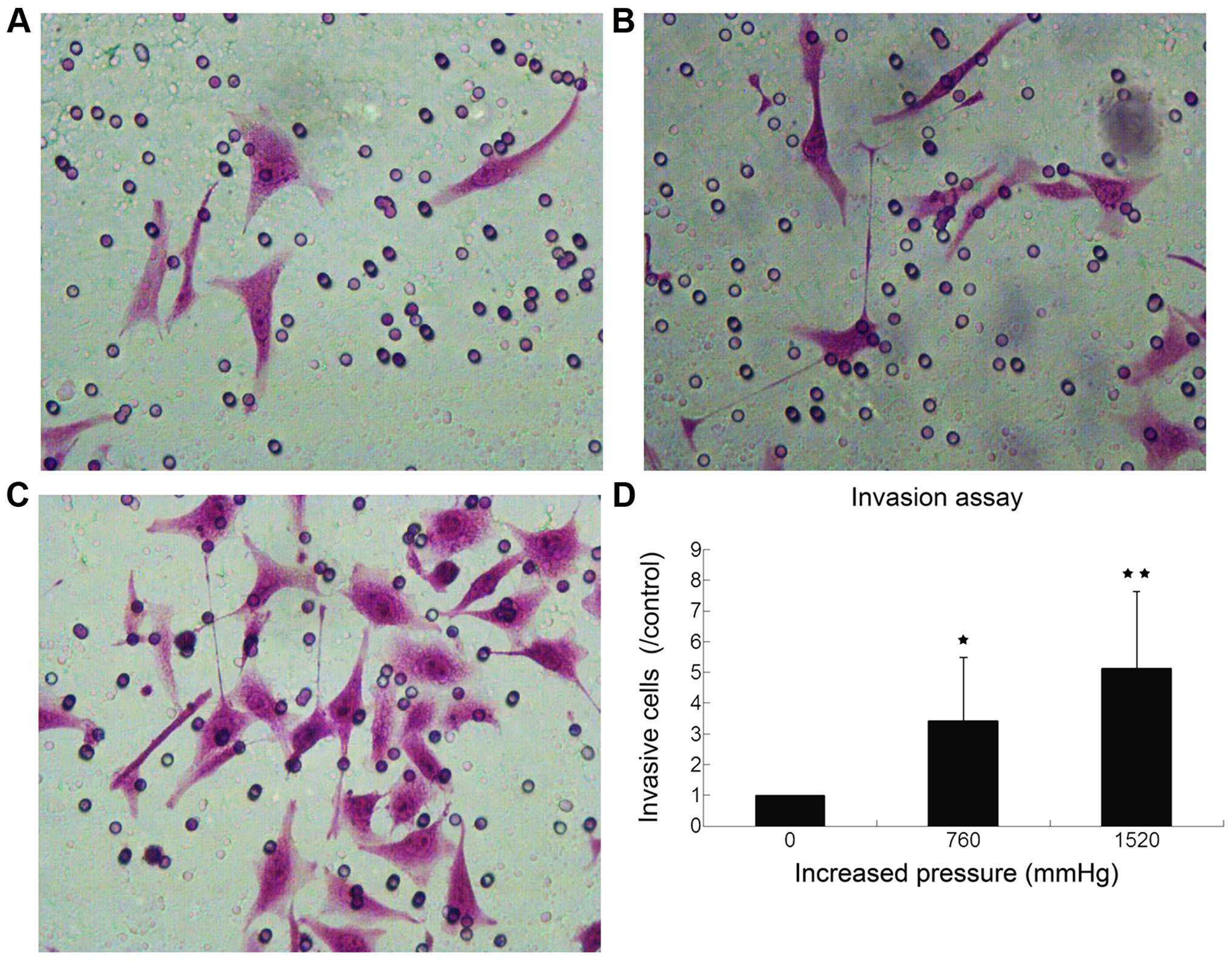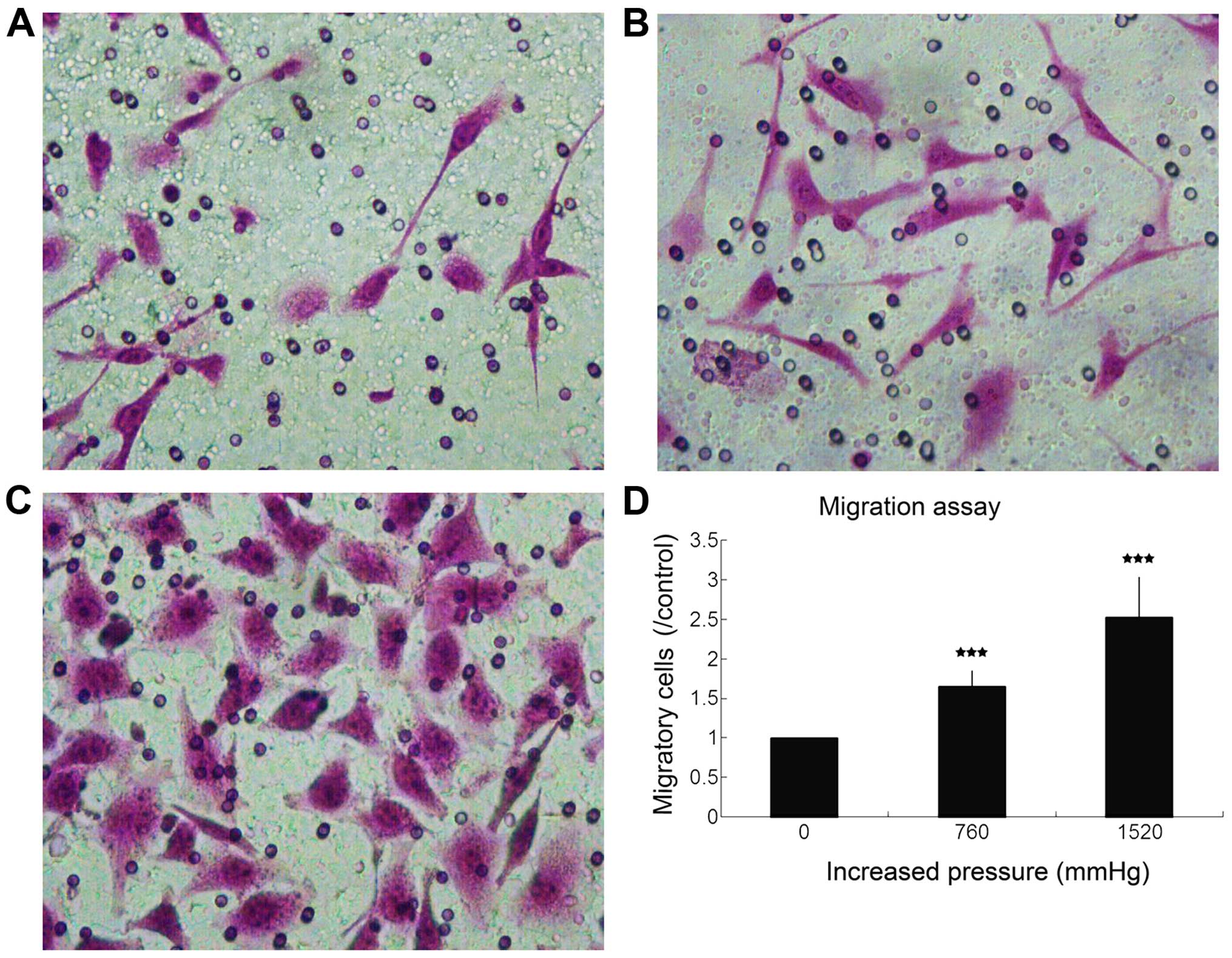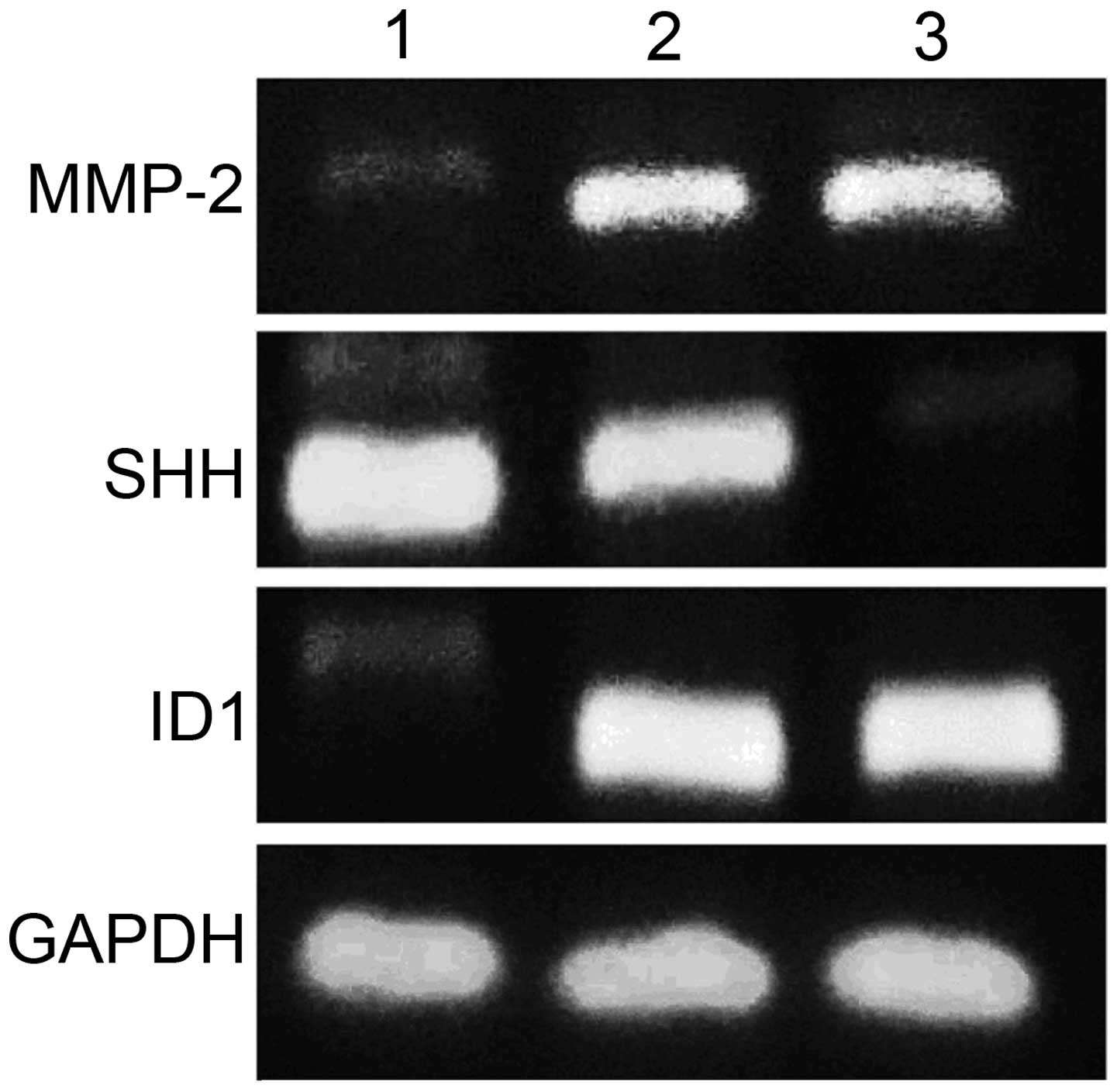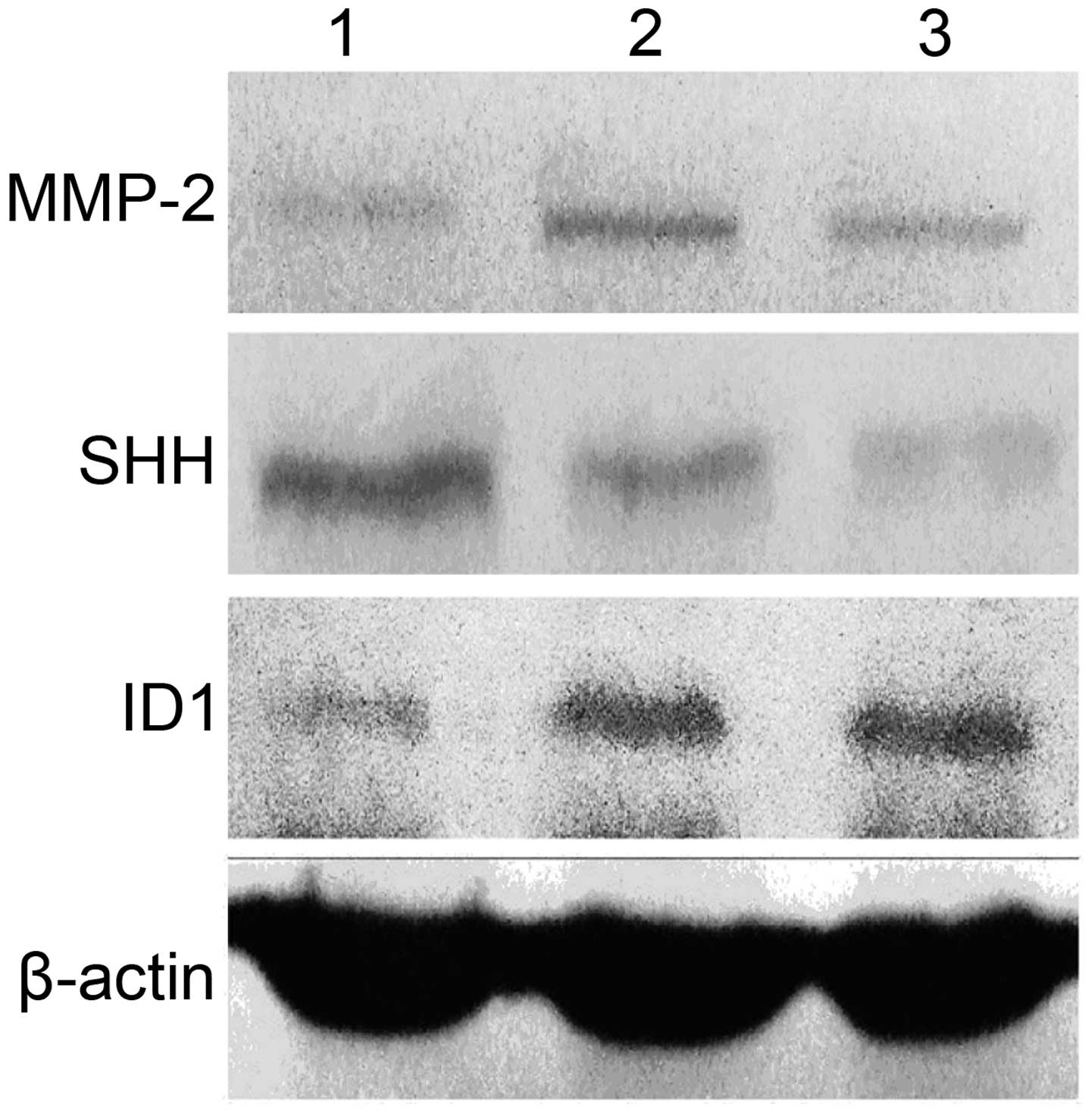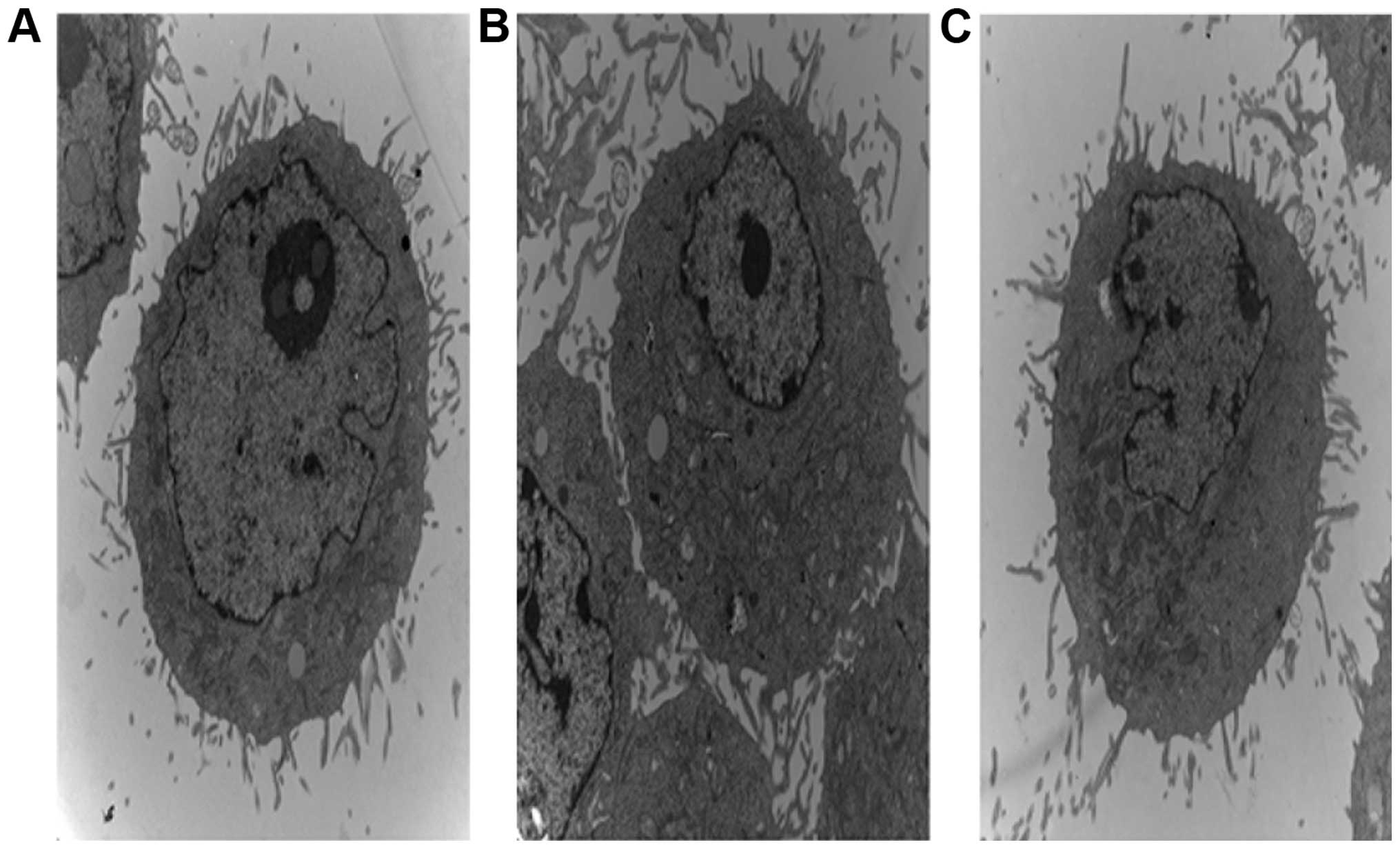|
1
|
Parkin DM, Bray F, Ferlay J and Pisani P:
Global cancer statistics, 2002. CA Cancer J Clin. 55:74–108. 2005.
View Article : Google Scholar : PubMed/NCBI
|
|
2
|
Catalano V, Labianca R, Beretta GD, Gatta
G, de Braud F and Van Cutsem E: Gastric cancer. Crit Rev Oncol
Hematol. 71:127–164. 2009. View Article : Google Scholar : PubMed/NCBI
|
|
3
|
Siegel R, Naishadham D and Jemal A: Cancer
statistics, 2013. CA Cancer J Clin. 63:11–30. 2013. View Article : Google Scholar : PubMed/NCBI
|
|
4
|
Basson MD, Yu CF, Herden-Kirchoff O,
Ellermeier M, Sanders MA, Merrell RC and Sumpio BE: Effects of
increased ambient pressure on colon cancer cell adhesion. J Cell
Biochem. 78:47–61. 2000. View Article : Google Scholar : PubMed/NCBI
|
|
5
|
Conway WC, Van der Voort van Zyp J,
Thamilselvan V, Walsh MF, Crowe DL and Basson MD: Paxillin
modulates squamous cancer cell adhesion and is important in
pressure-augmented adhesion. J Cell Biochem. 98:1507–1516. 2006.
View Article : Google Scholar : PubMed/NCBI
|
|
6
|
Downey C, Alwan K, Thamilselvan V, Zhang
L, Jiang Y, Rishi AK and Basson MD: Pressure stimulates breast
cancer cell adhesion independently of cell cycle and apoptosis
regulatory protein (CARP)-1 regulation of focal adhesion kinase. Am
J Surg. 192:631–635. 2006. View Article : Google Scholar : PubMed/NCBI
|
|
7
|
Walsh MF, Woo RK, Gomez R and Basson MD:
Extracellular pressure stimulates colon cancer cell proliferation
via a mechanism requiring PKC and tyrosine kinase signals. Cell
Prolif. 37:427–441. 2004. View Article : Google Scholar : PubMed/NCBI
|
|
8
|
Hirabayashi Y, Yamaguchi K, Shiraishi N,
Adachi Y, Saiki I and Kitano S: Port-site metastasis after
CO2 pneumoperitoneum: Role of adhesion molecules and
prevention with antiadhesion molecules. Surg Endosc. 18:1113–1117.
2004. View Article : Google Scholar : PubMed/NCBI
|
|
9
|
Vanhaesebroeck B, Leevers SJ, Ahmadi K,
Timms J, Katso R, Driscoll PC, Woscholski R, Parker PJ and
Waterfield MD: Synthesis and function of 3-phosphorylated inositol
lipids. Annu Rev Biochem. 70:535–602. 2001. View Article : Google Scholar : PubMed/NCBI
|
|
10
|
Thamilselvan V, Craig DH and Basson MD:
FAK association with multiple signal proteins mediates
pressure-induced colon cancer cell adhesion via a Src-dependent
PI3K/Akt pathway. FASEB J. 21:1730–1741. 2007. View Article : Google Scholar : PubMed/NCBI
|
|
11
|
Thamilselvan V and Basson MD: The role of
the cytoskeleton in differentially regulating pressure-mediated
effects on malignant colonocyte focal adhesion signaling and cell
adhesion. Carcinogenesis. 26:1687–1697. 2005. View Article : Google Scholar : PubMed/NCBI
|
|
12
|
Craig DH, Gayer CP, Schaubert KL, Wei Y,
Li J, Laouar Y and Basson MD: Increased extracellular pressure
enhances cancer cell integrin-binding affinity through
phosphorylation of beta1-integrin at threonine 788/789. Am J
Physiol Cell Physiol. 296:C193–C204. 2009. View Article : Google Scholar
|
|
13
|
Perry BC, Wang S and Basson MD:
Extracellular pressure stimulates adhesion of sarcoma cells via
activation of focal adhesion kinase and Akt. Am J Surg.
200:610–614. 2010. View Article : Google Scholar : PubMed/NCBI
|
|
14
|
Wang S and Basson MD: Identification of
functional domains in AKT responsible for distinct roles of AKT
isoforms in pressure-stimulated cancer cell adhesion. Exp Cell Res.
314:286–296. 2008. View Article : Google Scholar
|
|
15
|
van Zyp J, Conway WC, Craig DH, van Zyp N,
Thamilselvan V and Basson MD: Extracellular pressure stimulates
tumor cell adhesion in vitro by paxillin activation. Cancer Biol
Ther. 5:1169–1178. 2006. View Article : Google Scholar : PubMed/NCBI
|
|
16
|
Downey C, Craig DH and Basson MD: Pressure
activates colon cancer cell adhesion via paxillin phosphorylation,
Crk, Cas, and Rac1. Cell Mol Life Sci. 65:1446–1457. 2008.
View Article : Google Scholar : PubMed/NCBI
|
|
17
|
Downey C, Craig DH and Basson MD:
Isoform-specific modulation of pressure-stimulated cancer cell
proliferation and adhesion by α-actinin. Am J Surg. 202:520–523.
2011. View Article : Google Scholar : PubMed/NCBI
|
|
18
|
Wang S and Basson MD: Integrin-linked
kinase: A multi-functional regulator modulating extracellular
pressure-stimulated cancer cell adhesion through focal adhesion
kinase and AKT. Cell Oncol. 31:273–289. 2009.PubMed/NCBI
|
|
19
|
Li XD, Ji M, Wu J, Jiang JT and Wu CP:
Clinical significance of CD44 variants expression in colorectal
cancer. Tumori. 99:88–92. 2013.PubMed/NCBI
|
|
20
|
Tester AM, Waltham M, Oh SJ, Bae SN, Bills
MM, Walker EC, Kern FG, Stetler-Stevenson WG, Lippman ME and
Thompson EW: Pro-matrix metalloproteinase-2 transfection increases
orthotopic primary growth and experimental metastasis of MDA-MB-231
human breast cancer cells in nude mice. Cancer Res. 64:652–658.
2004. View Article : Google Scholar : PubMed/NCBI
|
|
21
|
Kubben FJ, Sier CF, van Duijn W, Griffioen
G, Hanemaaijer R, van de Velde CJ, van Krieken JH, Lamers CB and
Verspaget HW: Matrix metalloproteinase-2 is a consistent prognostic
factor in gastric cancer. Br J Cancer. 94:1035–1040. 2006.
View Article : Google Scholar : PubMed/NCBI
|
|
22
|
Curran S and Murray GI: Matrix
metalloproteinases: Molecular aspects of their roles in tumour
invasion and metastasis. Eur J Cancer. 36:1621–1630. 2000.
View Article : Google Scholar : PubMed/NCBI
|
|
23
|
Ray JM and Stetler-Stevenson WG:
Gelatinase A activity directly modulates melanoma cell adhesion and
spreading. EMBO J. 14:908–917. 1995.PubMed/NCBI
|
|
24
|
Norton JD and Atherton GT: Coupling of
cell growth control and apoptosis functions of Id proteins. Mol
Cell Biol. 18:2371–2381. 1998. View Article : Google Scholar : PubMed/NCBI
|
|
25
|
Fong S, Debs RJ and Desprez PY: Id genes
and proteins as promising targets in cancer therapy. Trends Mol
Med. 10:387–392. 2004. View Article : Google Scholar : PubMed/NCBI
|
|
26
|
Zavros Y, Waghray M, Tessier A, Bai L,
Todisco A, L Gumucio D, Samuelson LC, Dlugosz A and Merchant JL:
Reduced pepsin A processing of sonic Hedgehog in parietal cells
precedes gastric atrophy and transformation. J Biol Chem.
282:33265–33274. 2007. View Article : Google Scholar : PubMed/NCBI
|
|
27
|
Daulhac L, Kowalski-Chauvel A, Pradayrol
L, Vaysse N and Seva C: Gastrin stimulates the formation of a
p60Src/p125FAK complex upstream of the
phosphatidylinositol 3-kinase signaling pathway. FEBS Lett.
445:251–255. 1999. View Article : Google Scholar : PubMed/NCBI
|
|
28
|
Dockray G, Dimaline R and Varro A:
Gastrin: Old hormone, new functions. Pflugers Arch. 449:344–355.
2005. View Article : Google Scholar
|
|
29
|
Feng R, Xiao C and Zavros Y: The role of
Sonic Hedgehog as a regulator of gastric function and
differentiation. Vitam Horm. 88:473–489. 2012. View Article : Google Scholar : PubMed/NCBI
|
|
30
|
Li X, Deng W, Nail CD, Bailey SK, Kraus
MH, Ruppert JM and Lobo-Ruppert SM: Snail induction is an early
response to Gli1 that determines the efficiency of epithelial
transformation. Oncogene. 25:609–621. 2006.
|















